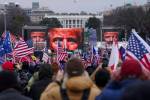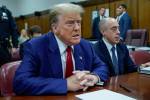Review-Journal sues to open HOA fraud investigation’s secret files
Secret evidence in the federal investigation into the massive scheme to take over and defraud Las Vegas Valley homeowners associations should be open to the public, the Las Vegas Review-Journal argued in federal court papers filed Tuesday.
The HOA investigation, spearheaded by the Justice Department’s fraud section in Washington, is considered the largest public corruption case federal authorities have brought in Southern Nevada. A total of 38 defendants, including the scheme’s mastermind, former construction company boss Leon Benzer, pleaded guilty and four more defendants were convicted at trial.
“The scale of corruption in these HOA cases is almost unimaginable,” Review-Journal Editor Michael Hengel said. “Even with dozens of convictions, there is much the public does not know about the scope of this conspiracy, how it could have gone undetected so long and how it could have involved so many people. Many of the answers are in these documents.”
But for a dozen sentencings and one minor player waiting to be tried, the high-profile case is essentially over. Federal prosecutors estimate the intent of the scheme was to bilk more than $60 million from its victims.
“Throughout the pendency of this case, the Review-Journal and the public have been prevented from accessing certain filings, documents and hearings,” attorney Maggie McLetchie wrote in the court papers.
“Now that the charges in this case have all been resolved, the First Amendment and common law rights of the press and the public to access the courts and trials carried out in those courts demands that these documents and hearings be unsealed, and the protective orders entered in this case be dissolved.”
The newspaper asks for dissolution of two protective orders signed by U.S. Magistrate Judge George Foley Jr. — one on Jan. 28, 2013 and the other on May 12, 2014 — that withheld the evidence from the public. The orders were handed out in the criminal fraud case against Benzer and 10 others indicted on Jan. 15, 2013.
Under the protective orders, prosecutors gave defense lawyers more than 3.5 million pages of documents collected during the long-running investigation, which became public in September 2008 with FBI-led raids across the Las Vegas Valley. Those documents include FBI and police reports of witnesses and the cooperating defendants, search warrant affidavits and grand jury testimony.
McLetchie said the protective orders are “unnecessarily broad” and allow the government to declare a document protected with no court oversight.
“Effectively, the government has been rendered the arbiter of whether the Review-Journal’s First Amendment and common law rights are trumped by either the government’s interest in economizing or by the Sixth Amendment rights of any or all of the defendants,” McLetchie wrote.
“The combination of the breadth of the protective orders and the fact that there was no opportunity for the Review-Journal or any member of the public to oppose their entry in this matter means that there exists the possibility that numerous documents … have been kept from the public unnecessarily and perhaps unjustifiably.”
McLetchie also said that 15 documents listed on the extensive electronic docket in the case are sealed, were sealed at one time, or contain exhibits that are sealed.
There also are 79 gaps in the more than 620 docket entries, suggesting more documents might have been filed under seal, according to McLetchie.
Because the case is over, dissolving the protective orders no longer poses a risk to the constitutional rights of the defendants to get a fair trial, “and there appears to no longer be any need to continue holding these documents and hearings under seal,” McLetchie said.
From its beginning, the takeover investigation struck deep into the heart of the region’s criminal justice community, targeting judges, lawyers and former police officers. No judges were ever charged, but four lawyers and three police officers ended up striking plea deals with the government. Several alleged conspirators committed suicide.
Benzer, who is waiting to be sentenced, sought to take over a dozen HOAs between 2003 and 2009, according to prosecutors. Straw buyers were recruited, and elections were rigged to place them on the HOA boards where they could steer millions of dollars in construction defect repair contracts to Benzer’s company.
Justice Department lawyers took the reins of the investigation from the U.S. attorney’s office in Nevada in late 2010 after allegations that targets of the investigation had received inside information leaked from that office.
The Justice Department conducted a secret investigation but could not substantiate any leaks. Government reports of that investigation are believed to have been provided to defense lawyers under the protective orders.
Contact Jeff German at jgerman@reviewjournal.com or 702-380-8135. Follow @JGermanRJ on Twitter.
Former Republican official gets prison in HOA fraud case
Key HOA defendant gets four months in prison
Ex-cop avoids prison term in HOA scheme
Las Vegas lawyer’s misdeeds draw lengthy prison term
Las Vegas HOA sentences could be based on $60M in losses





























